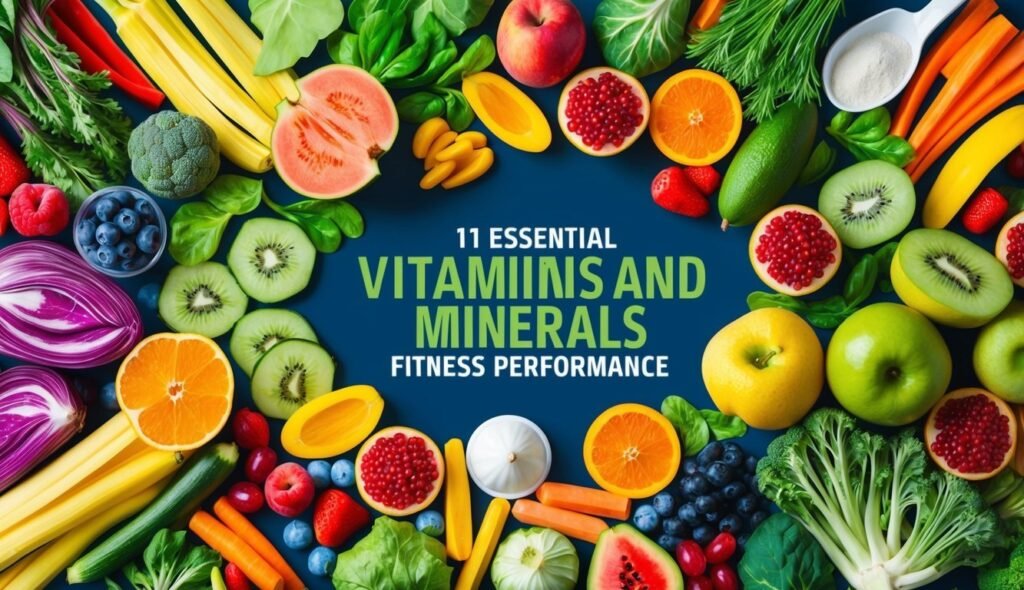Eating a well-balanced diet is essential for achieving your fitness goals.
The right vitamins and minerals can make a big difference in how you feel and perform during workouts.
From boosting your energy levels to improving recovery, these nutrients play a crucial role in your overall fitness routine.
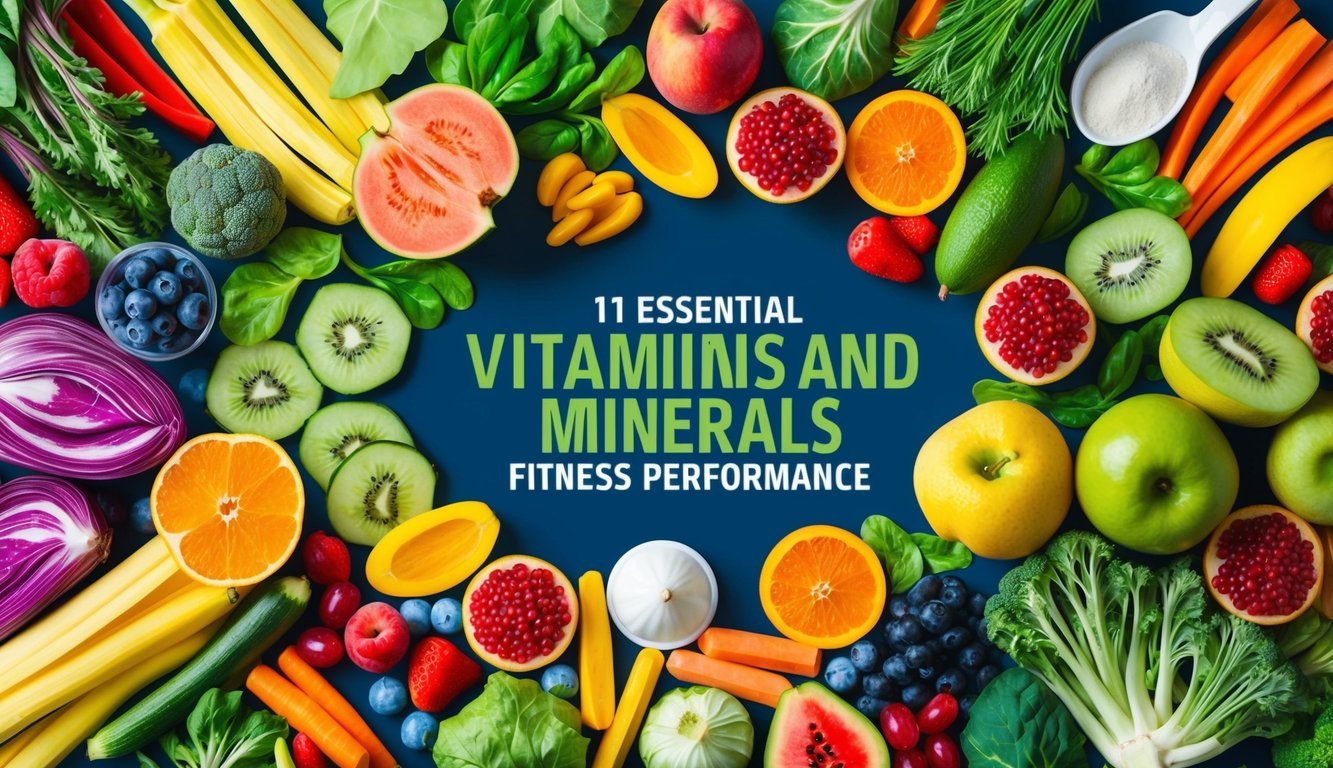
Understanding which vitamins and minerals are most important for fitness can help you optimize your diet for better results. Even small changes to your nutrition can lead to noticeable improvements in performance.
By focusing on these key nutrients, you’re setting yourself up for success in your fitness journey.
1) Vitamin D
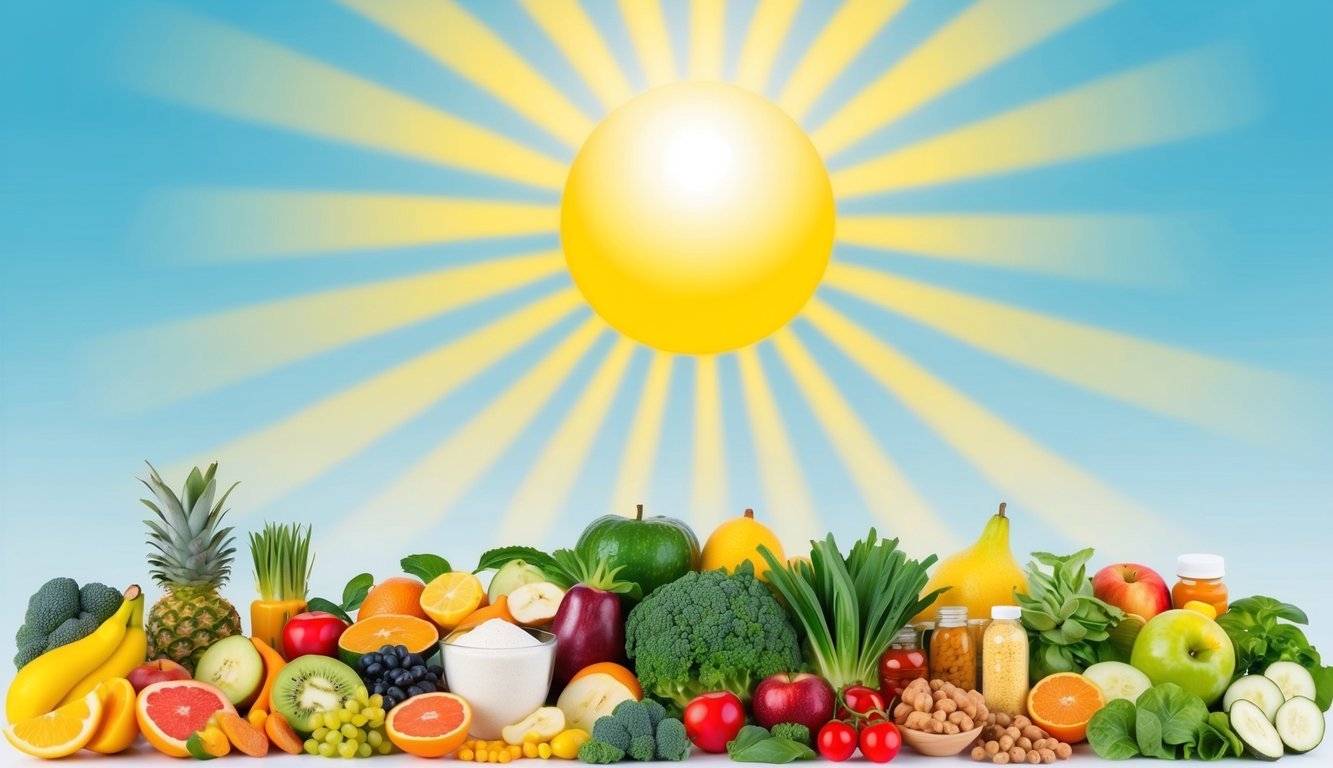
Vitamin D is a key player when it comes to keeping your bones strong.
It helps your body absorb calcium, which is important for bone health.
When you’re active, strong bones support your movements and reduce the risk of injuries.
Your muscles also benefit from vitamin D. It plays a role in muscle function, which can boost your athletic performance.
This vitamin contributes to muscle strength, so you’re better equipped for physical activities like running or lifting weights.
Low levels of vitamin D might lead to weaker muscles.
Ensuring you have enough of this vitamin can help maintain your muscle mass.
This is especially crucial if you’re into sports or regular exercise.
Sunlight is a natural source of vitamin D. Spending time outside can help your body produce it.
Foods like fortified milk and fish are also good options if you’re looking to increase your intake.
If you think you aren’t getting enough vitamin D, you might consider supplements.
This can be helpful, especially during winter months when sunlight is limited.
Always check with a healthcare professional before starting any supplement.
They can guide you based on your individual needs and lifestyle.
2) Magnesium
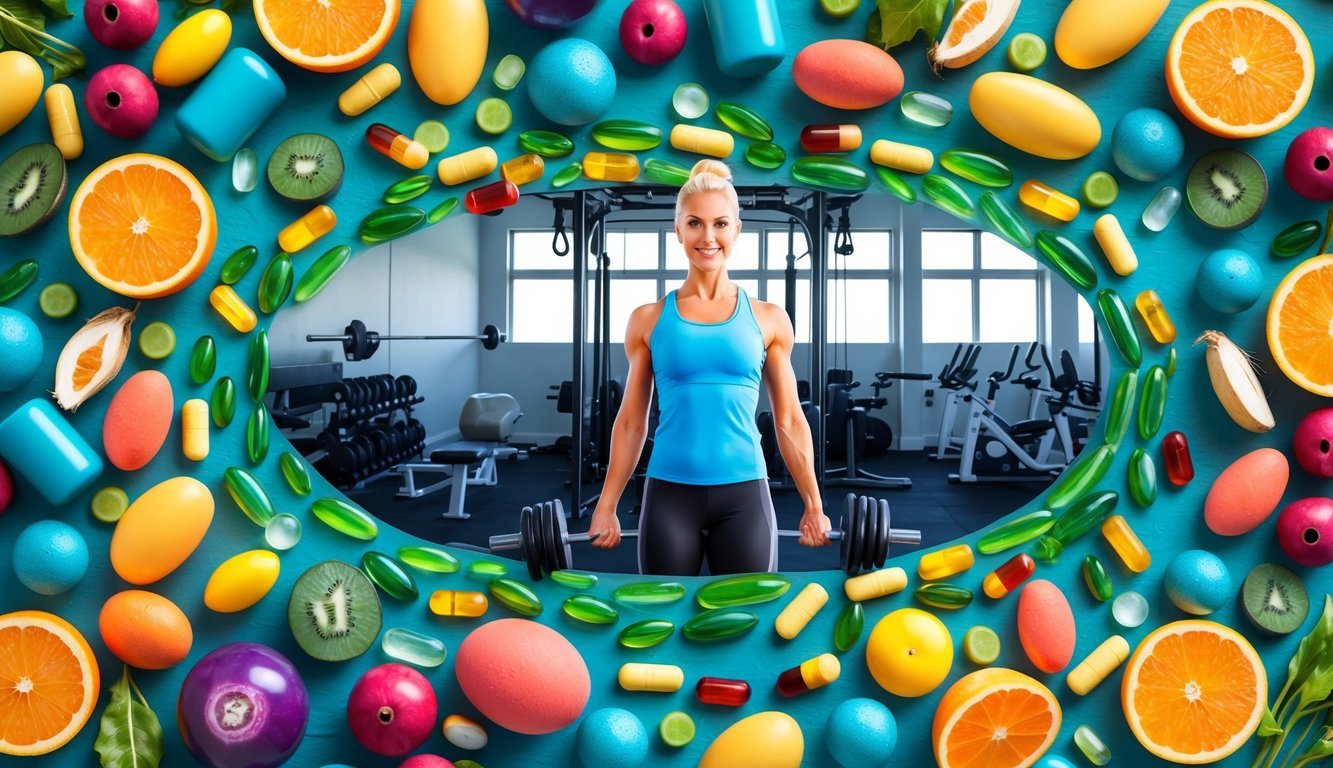
Magnesium is a vital mineral that plays a significant role in your body’s functioning, especially when it comes to athletic performance.
It’s involved in energy production and muscle contractions, both crucial for any workout.
If you feel tired quickly during exercise, low magnesium levels might be a reason.
Including magnesium in your diet can also help reduce muscle cramps.
Foods like spinach, almonds, and whole grains are excellent sources.
Sometimes athletes choose to take supplements to ensure they get enough magnesium.
Studies suggest that magnesium may boost your exercise performance, particularly in activities involving lots of energy and endurance.
This means it might help you go the extra mile in your workouts.
For a deeper dive into magnesium’s effects on exercise, articles discuss how magnesium may impact performance by examining serum levels in athletes.
Check out more details in the study examining magnesium’s role in exercise.
Always think about your individual needs and, if you’re considering supplements, talk to a healthcare provider.
3) Iron
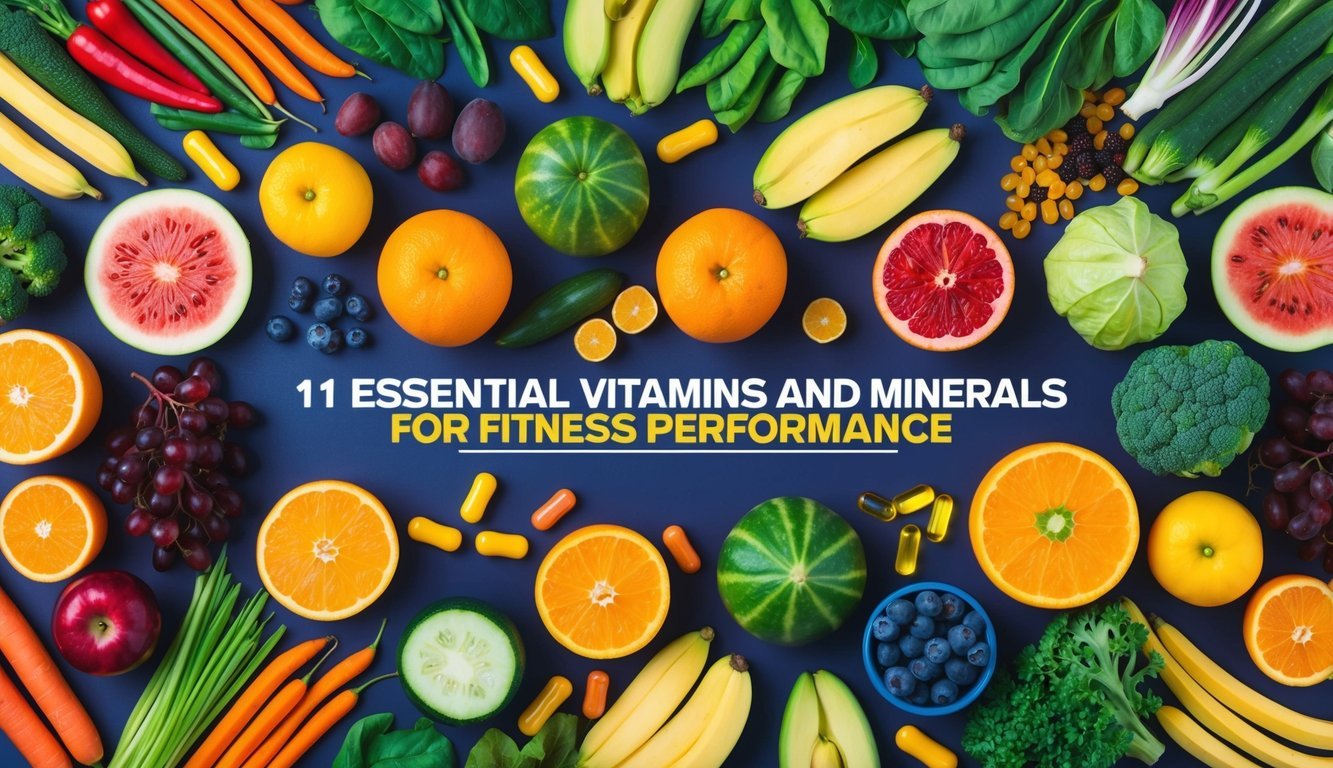
Iron plays a big role in your body’s ability to perform during exercise.
It’s crucial for making hemoglobin, a protein that helps carry oxygen in your blood.
If you don’t have enough iron, you might feel tired and have less endurance during workouts.
Iron deficiency can lead to anemia, a condition where your body doesn’t get enough oxygen.
This can greatly reduce your physical performance.
Women athletes are at higher risk of iron deficiency, so they might need to monitor their iron levels more closely.
While iron supplements might seem like a quick fix, taking them without medical advice isn’t recommended.
Some evidence suggests that exercise can increase your iron needs, but it’s important to get a doctor’s opinion before starting supplements.
This is because too much iron can be harmful.
Eating iron-rich foods like red meat, beans, and spinach can help maintain your iron levels.
If you’re vegetarian or vegan, you might need to pay more attention to your diet to ensure you get enough iron.
4) Vitamin C
Vitamin C is a key player when it comes to fitness.
It helps keep your immune system strong, which is important when you’re pushing your body hard during workouts.
You might wonder if vitamin C can boost your exercise performance.
Some studies suggest that while it may not directly improve performance, it can help reduce muscle soreness after intense activities.
This means you could recover faster and get back to training sooner.
Vitamin C is also an antioxidant.
This means it helps protect your body from damage caused by free radicals, which are produced during exercise.
By keeping these in check, vitamin C might aid in preventing muscle damage.
To include more vitamin C in your diet, think about eating foods like oranges, strawberries, and bell peppers.
If you’re considering supplements, check out how vitamin C supplements fit into your routine.
Just make sure you don’t overdo it because too much vitamin C can cause stomach issues.
However, moderate amounts are generally safe and beneficial for your fitness journey.
5) Zinc
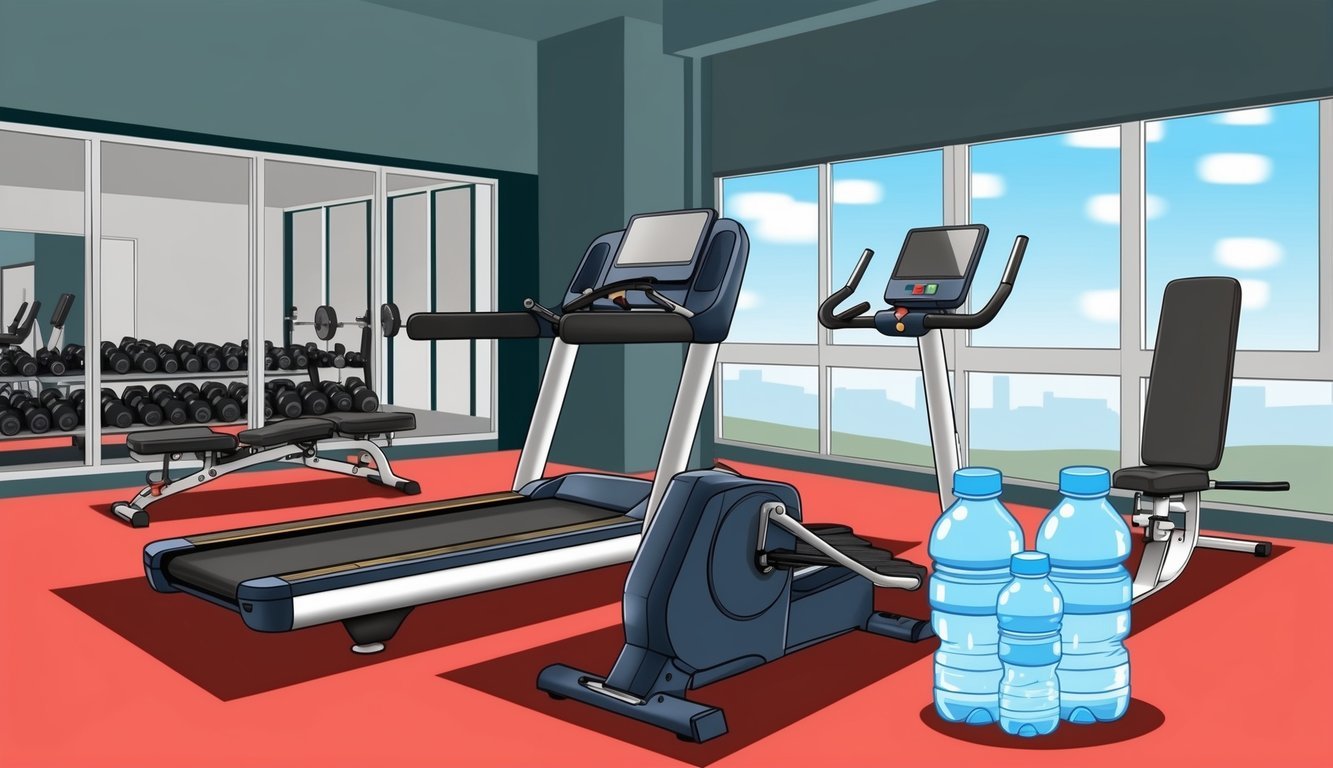
Zinc is a key player in your body when it comes to fitness and exercise.
It helps repair cells and boosts your immune system.
This means it’s vital for recovering after a workout.
When you exercise intensely, your body can lose zinc through sweat.
Losing too much might affect your performance, making it harder to reach your goals.
Supplementing zinc could be helpful for those with low levels, but it’s important not to overdo it.
Too much zinc can cause problems and compete with other minerals like copper.
Research has suggested that zinc can impact your body’s ability to build muscle and strengthen bones.
These are important factors when you’re focused on improving overall fitness.
Maintaining the right zinc levels could make a difference in your physical performance.
You might want to keep an eye on your zinc intake, especially if you’re on a special diet or working out hard.
For more detailed insights on how zinc affects athletic performance, you can refer to information on zinc status in athletes.
6) Calcium
Calcium is super important for your bones and teeth.
It’s not just about keeping them strong; it’s also about helping your muscles work right.
When you work out, your muscles need calcium to contract properly.
You’re probably getting a lot of calcium from foods like milk, cheese, and yogurt.
If you’re into plant-based diets, leafy greens and fortified foods also have a good amount.
For athletes, calcium helps with more than just bone health.
It plays a role in exercise performance, as your muscles rely on it during exercise bouts.
When you’re sweating, you might lose some calcium, so it’s important to keep your intake up.
Women, especially, should make sure they’re getting enough calcium.
Female athletes may need more to support their bone health and athletic performance.
Calcium supplements can be beneficial, especially if dietary intake isn’t enough.
7) Folate
Folate is a vitamin that’s key for DNA repair and producing red blood cells.
You need folate to help keep your muscles working well during workouts.
Low levels might make you feel tired easily.
When you don’t get enough folate, you can end up with anemia.
This condition reduces your blood’s ability to transport oxygen, which may slow you down during physical activities.
Incorporating foods rich in folate into your diet is a smart move.
Leafy greens, lentils, and chickpeas are great sources.
If you find it hard to get enough through food, a supplement might be a good option.
Research suggests that sufficient folate levels can make a positive difference in your exercise performance, especially if combined with other important nutrients.
Keeping up with your folate intake ensures your body’s performance doesn’t lag.
8) Vitamin B12
Vitamin B12 is key for keeping your energy levels up, which is essential for fitness.
It helps your body make red blood cells, which carry oxygen to your muscles.
This means you’re less likely to feel tired during workout sessions.
Getting enough vitamin B12 also plays a part in keeping your nervous system healthy.
This is important for sending signals from your brain to your muscles, helping you move more efficiently.
With better nerve function, your movements can be quicker and more precise.
You can find vitamin B12 naturally in foods like meat, dairy, and eggs.
Vegetarians and vegans might need to look for fortified foods or supplements to keep their levels up.
In some studies, athletes who maintain good vitamin B12 status show improvements in endurance.
For example, a study on elite athletes suggests that maintaining ideal vitamin B12 levels benefits your athletic performance.
This could be due to better oxygen delivery and energy production.
Make sure you prioritize it in your diet to support your fitness goals.
9) Potassium
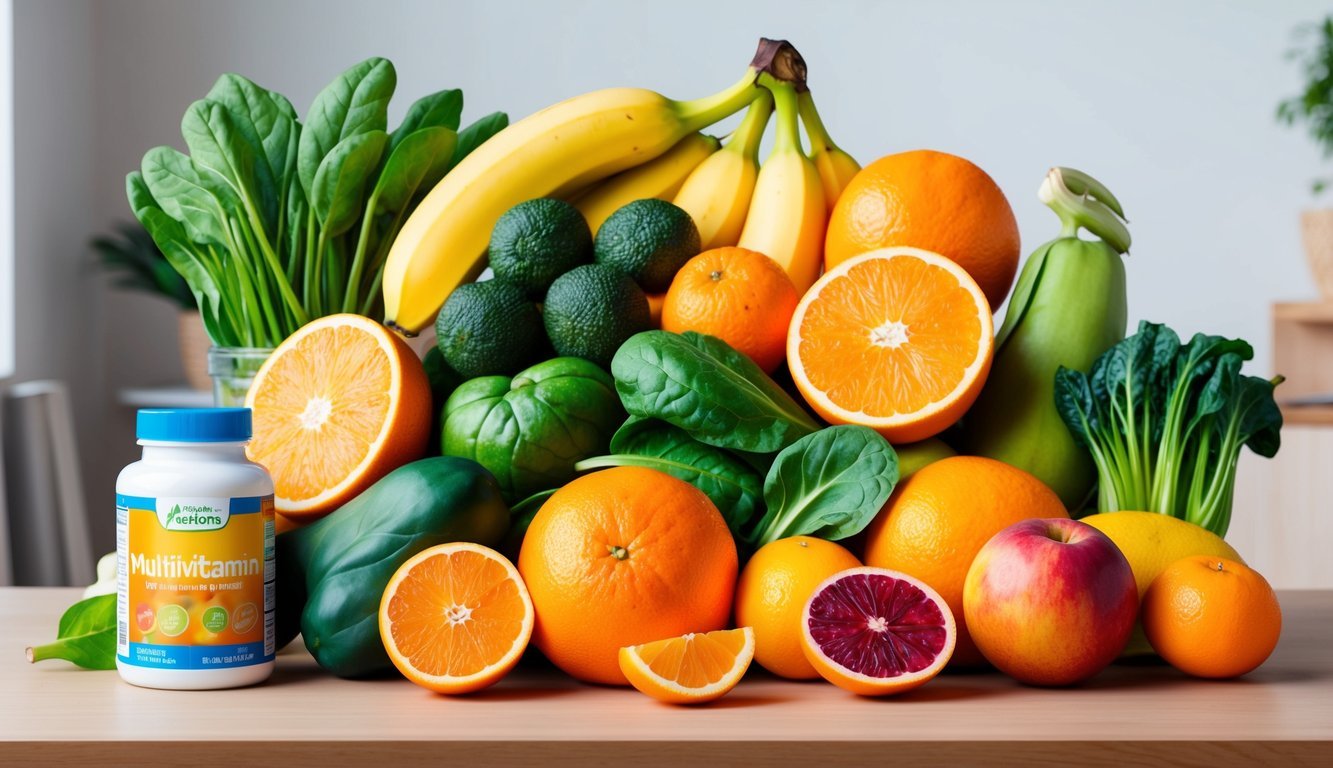
Potassium is a key player when it comes to fitness performance.
It’s an essential mineral that helps your muscles work properly.
When you’re working out, your muscles need potassium to contract and relax.
If you’ve ever experienced muscle cramps during exercise, low potassium might be to blame.
Keeping your potassium levels up can help prevent those annoying cramps.
Bananas are a popular go-to for a potassium boost.
But they’re not the only option.
You can also find potassium in foods like potatoes, oranges, and spinach.
This mineral also helps maintain fluid balance in your body.
When you’re sweating during a workout, you lose potassium.
So, it’s important to replenish it with the right foods or drinks.
Potassium even plays a role in heart function and helps regulate blood pressure.
This makes it a vital mineral for anyone, especially those who love to stay active.
For athletes considering supplements, there’s ongoing debate about potassium’s direct impact on performance.
While research continues, many agree that maintaining appropriate potassium levels is crucial for optimal function during exercise.
For more in-depth advice, especially if considering supplements, you can read about potassium’s importance to athletic performance.
10) Selenium

Selenium is a trace mineral that plays a vital role in many body functions, especially in exercise and fitness.
It’s known for its antioxidant properties, which help protect your cells from damage during intense workouts.
This protection can make a big difference in maintaining your overall health.
You might not realize it, but selenium also supports your immune system.
Keeping your immune system in check is important, especially when you’re pushing your body to the limits with regular exercise.
Having enough selenium could mean fewer sick days and more consistent training.
Selenium could also assist in improving muscle performance.
It helps with the production of a protein called glutathione peroxidase, which is involved in reducing muscle soreness and fatigue.
This can be particularly beneficial for athletes looking to optimize their performance.
It’s important to note that while selenium is beneficial, excessive intake can lead to side effects.
So, it’s best to get it from your diet through foods like Brazil nuts, seafood, and eggs.
To learn more about how selenium impacts exercise and athletic performance, you can check out research on this topic.
Iodine
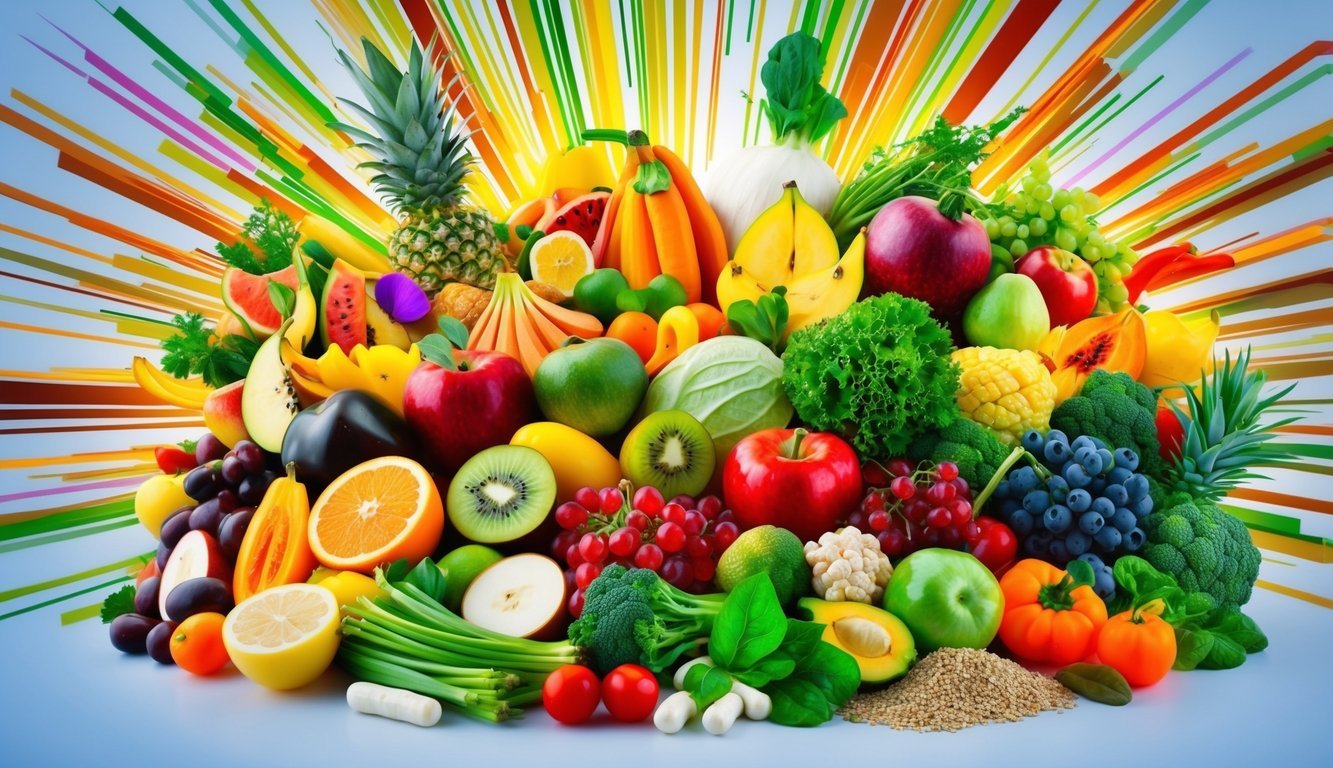
Iodine is one of those minerals you might not think about often, but it plays a crucial part in fitness performance.
It’s mainly known for supporting your thyroid gland, which helps control your metabolism.
A healthy metabolism is important when you’re looking to boost your energy levels and stamina during exercise.
When you work out, especially for long periods, your body may lose iodine through sweat.
This can potentially affect your thyroid function if you’re not getting enough iodine from your diet.
Foods like fish, dairy products, and iodized salt usually provide a good amount of iodine and can help keep your thyroid happy.
You’ll want to make sure you have a steady intake of iodine to avoid any dips in energy.
This is essential for athletes or anyone engaging in regular intense exercise.
If you’re not getting enough iodine, you might find it harder to maintain the energy and intensity needed for your fitness goals.
Understanding the Role of Vitamins and Minerals
To get the most out of your fitness routine, nutrition is key.
Vitamins and minerals play a big role in how your body performs.
They help with energy, muscle function, and recovery.
Why Nutrition Matters for Fitness
Nutrition affects how well you can perform during workouts.
Eating the right foods fuels your body and keeps you energized.
Vitamins like B-complex are critical for breaking down food into energy, which is exactly what you need when you’re exercising.
Without proper nutrition, your energy levels can drop, making workouts harder and less effective.
Minerals are also crucial.
For example, calcium and magnesium support strong bones and proper muscle function.
Iron, found in leafy greens and meat, helps carry oxygen in your blood.
This makes it easier to keep up your stamina during long training sessions.
How Micronutrients Influence Performance
Micronutrients, including vitamins and minerals, have direct effects on your body’s performance.
Vitamins like C and E work as antioxidants.
They help reduce damage to your muscles after intense exercises.
This can lead to quicker recovery times, so you’re ready for the next workout sooner.
Minerals like potassium and sodium manage fluid balance and muscle contractions.
They are often lost through sweat, so replenishing them is crucial.
Zinc supports your immune function, keeping you healthy and able to stick to your fitness routine.
Even a small deficiency in any of these can limit your performance.
Optimizing Workouts with Essential Nutrients
To get the most out of your workouts, focusing on the right vitamins and minerals is crucial.
This means boosting energy levels for more intense sessions and enhancing muscle recovery for faster gains.
Ensuring your body gets enough protein, along with key nutrients like vitamin D and magnesium, can significantly improve performance and endurance.
Hydration and proper supplementation also play a vital role in faster muscle gain strategies, helping to reduce fatigue and support overall strength development.
By combining these elements with a well-balanced diet, you can maximize your workout efficiency and see better results over time.
Boosting Energy Levels
Having enough energy during workouts is all about the right nutrients.
Carbohydrates are your body’s main fuel source, but certain vitamins and minerals play vital roles too.
B vitamins like B1, B2, B3, B5, B6, B7, B9, and B12 help convert food into energy.
Without them, you might feel sluggish and unable to perform at your best.
Iron is another big player.
It helps your blood carry oxygen, which is essential for muscle function and stamina.
A deficiency can make you feel tired and weak, so making sure you have enough iron in your diet is essential for maintaining high energy levels during workouts.
Magnesium also supports energy production, so keeping it in your system can help sustain longer, more effective athletic sessions.
Enhancing Muscle Recovery
After an intense workout, your muscles need to recover and repair.
Nutrients like protein play a crucial role in this.
Protein is packed with amino acids that help in muscle recovery.
Vitamins and minerals are also important.
Vitamin D, for example, is essential for muscle function.
It also helps in calcium absorption, which is vital for muscle contractions.
Zinc is another nutrient that supports recovery.
It supports cell growth and repair.
Meanwhile, potassium helps manage muscle cramps and soreness.
These two nutrients are key to a faster recovery.

